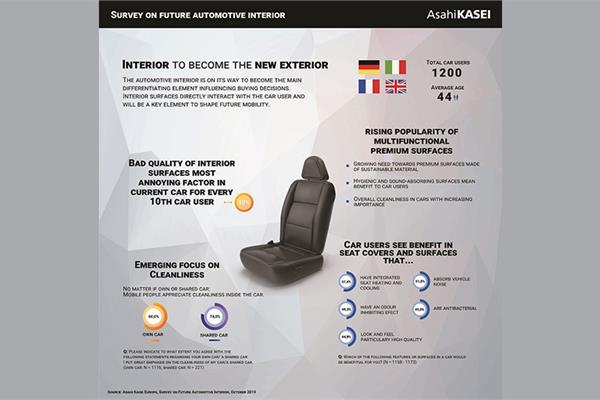
According to a new survey by Asahi Kasei Europe, automotive interior features such as premium, hygienic and sound-absorbing surfaces, will become a differentiating element and influence buying decisions.
CASE (Connected, Autonomous, Shared, Electric) megatrends, such as new mobility behaviours and the growing autonomy of cars, will profoundly impact the user's driving experience and are bringing forth an evolution in the automotive industry, with rising requests for more functional surfaces.
In fact, due to the increasing autonomy of the car, passengers will have to focus less on the traffic and will have more time to spend on work, in-car entertainment or just relaxation. As a result, the functionality of automotive interiors will become increasingly important.
In October 2019, Asahi Kasei Europe conducted a representative survey together with Cologne-based market research institute SKOPOS, interviewing a total of 1,200 car users in Germany, France, Italy and the United Kingdom to better understand customers' needs and their expectations form future automotive interiors.
Interiors will influence buying decisions
When buying the next car, 18.3% of all respondents in the four main European automotive markets will not buy the same brand as the current car, 34,9% are still undecided.
The differentiating factor will not only be the exterior design, but also the interiors one: the passenger compartment is becoming an increasingly important factor next to exterior, drivetrain, driving performance and fuel economy.
When purchasing the current car, the interior design (e.g. seats, surfaces, etc.) was important to 54.8%, compared to 57.2% who paid more attention to the exterior design. Looking ahead to the purchase of the next car, the interior is rising by 5 percent points (59.8%) in its importance, the exterior by 4 percent points (61.4%).
"Customer expectations are not changing over night, but gradually and much faster than we have seen in the past. More than half of the car buyers in Europe are ready to change the brand. A great chance for OEMs to win new customers by implementing convincing technologies which are touching all senses, addressing human emotions and needs", explained Heiko Rother, General Manager Business Development Automotive at Asahi Kasei Europe.
The increasing importance of sustainable surface materials
Automotive interior surfaces need to be attractive to the eye and smooth to the skin. They are the interface between the user and the vehicle and play a role also in the driving experience.
One out of ten respondents (10.3%) sees the poor processing quality of interior surface materials as the most annoying factor in the current car. 44.8% of all respondents see a benefit in surfaces that look and feel especially high quality - for example for seats, dashboards or headliners - compared to just 11.4% who do not. A third of all participants (32.5%) would be willing to pay a reasonable price for these surfaces as an extra equipment. While the word "reasonable" is of course strictly subjective, it shows the growing importance of interior surfaces.
Asked about the surface material itself, 57% of the respondents think that sustainable materials for seat covers and surfaces will be becoming increasingly important in the next 5 to 10 years, while the need for real leather equipment will fall drastically.
The rising needs towards hygienic and sound-absorbing surfaces
The results of the survey show an increasing need towards interior surfaces with further functions, with
49% of all respondents seeing a benefit in antibacterial properties.
Taking a closer look at the age structure, it turns out that car users from 18 - 39 years are seeing a stronger benefit of antibacterial surfaces, especially compared to the participants over 59 years.
The same trend can be seen in regard to seat covers and surfaces with odour-inhibiting properties. 49.3% see a benefit in these surfaces, which are again highly valued by the car users from 18 - 39 years. While there is an overall need for hygienic surfaces, stronger demand can be observed within the younger age groups, who are also more willing to accept additional costs for these surfaces.
The perception of sound and noise is evenly about to change as well. Already today 16.1% of the car users consider the driving noise as the most annoying factor of their current car. Looking ahead to the future automotive, the suppression of road and engine noise - now a challenge to many car users - will become even more urgent. While different materials and technologies inside the car can tackle this problem, visible interior surfaces can also play their part. 51.8% would see a benefit in noise-absorbing seat covers and surfaces, 35.9% are even inclined to book these surfaces for additional costs.
"With the passenger compartment moving more into the focus and becoming a key decision factor, we see significant potentials for differentiating technologies, addressing the passengers' senses and meeting highest demand", said Heiko Rother.